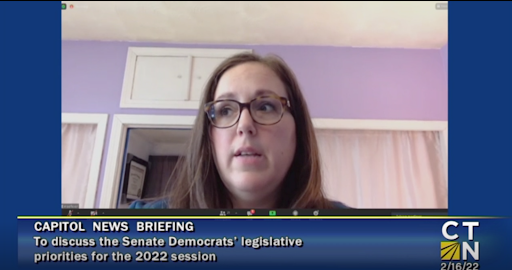Connecticut Democrats announce COVID-safe voting plan for 2022
Democratic leaders of the general assembly release a plan to continue voting by absentee ballot for the 2022 general election

Pia Baldwin Edwards, Contributing Photographer
Several Connecticut Democrats proposed a plan last week to continue COVID-safe voting via absentee ballot through the 2022 general election.
Senate President Martin M. Looney, House Speaker Matt Ritter, Senate Majority Leader Bob Duff and House Majority Leader Jason Rojas plan to pass this legislation during the current legislative session.
“Voting is the fundamental right underlying our entire democracy,” the Democratic leaders of the General Assembly wrote in a joint statement last Tuesday. “While other states are restricting voting rights, we will take action to ensure that everyone that was able to vote before COVID will continue to be able to vote this year as COVID persists. We will continue the COVID safety measures of 2020 and 2021 for 2022 and allow for everyone who fears exposure to COVID to vote by absentee ballot.”
Democrats in the legislature aim to address expanding access to voting before the upcoming general election. Sen. Mae Flexer told the News that she hopes to “extend absentee ballot provisions so that any voter can participate in the election this year.” Flexer also lamented elections during the pandemic in which voters were unsure of whether or not they could vote by absentee ballot.
Looney shared his support for having the extended absentee ballot voting continued into the 2022 election. Looney noted that voter turnout would diminish without this option for voters during the pandemic.
However, Rep. Anne Hughes said there is more to be done for voting rights in Connecticut.
“We can adopt opt-out automatic voter registration, we can increase the restoration of incarcerated voting rights; since our justice system disproportionately impacts low wealth, brown and Black communities, the denial of voting rights to those held within the Department of Correction (some without being charged or convicted), they should have the power to vote on who represents them and the laws controlling the Criminal justice system,” Hughes wrote to the News.
Although the plans to pass legislation to extend absentee ballot voting for the upcoming election would not affect those currently in the DOC, Hughes stressed the importance of advocating for their right to vote. She said that individuals returning from incarceration should have restored voting access. Hughes added that “there’s a lot more we can do as a state to make voting easier, more accessible, and more a part of everyday life for our whole community, wherever one lives.”
It remains unclear whether or not this absentee voting system will continue past the general election this year, but Senator Looney and Senator Flexer hope to pass no-excuse absentee ballot voting in the future.
“Our problem has been that… voting is enshrined in our state constitution so we have to make a constitutional change in order to do more far-reaching statutory change,” Looney said.
Flexer remains hopeful about making changes to voting laws in Connecticut, noting that there is an opportunity over the next eleven weeks “to change the hearts and minds of our Republican colleagues… so that once and for all, all Connecticut voters can have as many options as possible to exercise their right to vote.” View all of the Connecticut Post news coverage on ground.news.
Sen. Mae Flexer represents Brooklyn, Canterbury, Killingly, Mansfield, Putnam, Scotland, Thompson and Windham, CT.







